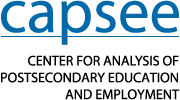CAPSEE Publications
How and Why Do Adjunct Instructors Affect Students’ Academic Outcomes? Evidence From Two-Year and Four-Year Colleges
By: Florence Xiaotao Ran & Di Xu | January 2017
Using student transcript records and detailed college instructor employment information from one state, this paper examines whether adjunct faculty have different impacts on student academic outcomes than tenure-track and tenured faculty.
The Earnings of Community College Graduates in California
By: Peter Riley Bahr | December 2016
This paper draws on longitudinal data for 1.1 million students in California to estimate the effects of community college credentials on students’ earnings, as compared with students who are not awarded a credential.
The Labor Market Returns to a Community College Education for Non-Completing Students
By: Peter Riley Bahr | December 2016
Extending recent work on the labor market returns to a community college education, this paper uses a comparable student-level fixed effects approach and panel data from California to investigate the returns to students who do not complete credentials.
The Fixed-Effects Model in Returns to Schooling and Its Application to Community Colleges: A Methodological Note
By: Susan Dynarski, Brian Jacob, & Daniel Kreisman | December 2016
In this short piece, the authors use data from Michigan to test the common-trends assumption that underlies the individual fixed-effects estimation strategy.
Performance Standards in Need-Based Student Aid
By: Judith Scott-Clayton & Lauren Schudde | December 2016
This paper illustrates student responses to Satisfactory Academic Progress (SAP) requirements as well as the tradeoffs faced by a social planner weighing whether to set performance standards in the context of need-based aid.
Goodbye to Summer Vacation? The Effects of Summer Enrollment on College and Employment Outcomes
By: Vivian Yuen Ting Liu | November 2016
Using proximity to the closest four-year college as an instrumental variable, this paper analyzes public higher education data from an anonymous state to examine how enrolling in summer credits can impact college and labor market outcomes.
Does Working Help or Hurt College Students? The Effects of Federal Work-Study Participation on Student Outcomes
By: Adela Soliz & Bridget Terry Long | November 2016
Using data on students in the Ohio public higher education system, this paper estimates the causal effects of participating in the Federal Work-Study program on college GPA, credits earned, and persistence.
Understanding the Relative Value of Alternative Pathways in Postsecondary Education: Evidence From the State of Virginia
By: Di Xu & Jeffrey Fletcher | October 2016
This book chapter replicates and extends analyses completed in other state-wide studies and estimates returns to credentials and credit accumulation for first-time college students who enrolled in the Virginia Community College System (VCCS) in 2004–2005 using a classic Mincerian Approach.
Returns to Vocational Credentials: Evidence from Ohio’s Community and Technical Colleges
By: Eric Bettinger & Adela Soliz | October 2016
This paper estimates the earnings returns to community and technical college associate degree and certificate programs in the state of Ohio.
Early Labor Market and Debt Outcomes for Bachelor’s Degree Recipients: Heterogeneity by Institution Type and Major, and Trends Over Time
By: Judith Scott-Clayton | July 2016
Using national data on baccalaureate recipients in 1993 and 2008, this paper examines labor market and debt outcomes four years after students graduate, with a focus on exploring heterogeneity by institution type and major, as well as trends over time.
